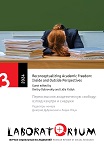IDEOLOGICAL PRODUCTION OF KNOWLEDGE IN LATE AND POST-SOVIET SOCIOLOGICAL DOCTORAL DISSERTATIONS: A COMPARATIVE STUDY OF TWO ACADEMIES
IDEOLOGICAL PRODUCTION OF KNOWLEDGE IN LATE AND POST-SOVIET SOCIOLOGICAL DOCTORAL DISSERTATIONS: A COMPARATIVE STUDY OF TWO ACADEMIES
Author(s): Ivan KislenkoSubject(s): Education, Epistemology, Sociology, Higher Education , Sociology of Education
Published by: Центр независимых социологических исследований (ЦНСИ)
Keywords: Soviet Science; Soviet Sociology; Soviet Doctoral Education; Knowledge Production; Russian Sociology; Ideology;
Summary/Abstract: Soviet sociology and the system of doctoral education as a whole were heavily permeated by ideology. During perestroika, a course toward general liberalization and glasnost was taken. In 1988 sociology was officially included in the list of scientific specializations of the Higher Attestation Commission (HAC) as an independent discipline. Nevertheless, there were several ideological practices that needed to be formally included in dissertations such as references to Marxism-Leninism, historical materialism, or even critiques of Western theories. This article focuses on such practices by analyzing summaries of 152 doctoral dissertations defended in 1988–1998. The summaries are divided into two groups: (a) 99 summaries of late Soviet doctoral dissertations in philosophy and sociology defended at the Academy of Social Sciences (AoSS) and the Institute of Sociology (IS) in the USSR’s final years (1988–1991); and (b) 53 summaries of post-Soviet dissertations in sociology defended at the same institutions in 1992–1998, after their restructuring. A comparative analysis allows us to highlight the presence of ideological practices in Soviet academic writing and their consequent influence on postSoviet dissertations based on the work done in two scientific organizations: IS as supposedly more liberal and AoSS as more conservative. The study is based on quantitative and qualitative content analysis methods as well as on the comparison of objective and subjective ideological practices in dissertation summaries of the two institutions.
Journal: Laboratorium. Журнал социальных исследований
- Issue Year: 16/2024
- Issue No: 3
- Page Range: 55-83
- Page Count: 29
- Language: English

